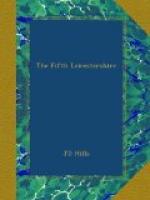Although we fought no pitched battles, the month included several little excitements of a minor sort, both in trenches and when out at rest. The first of these was the appearance of a Zeppelin over Dranoutre, where we were billeted. Fortunately only one bomb dropped anywhere near us, and this did no damage; the rest were all aimed at Bailleul and its aerodromes. We all turned out of bed, and stood in the streets to look at it, while many sentries blazed away with their rifles, forgetting that it was many hundred feet beyond the range of any rifle.
By the middle of April the Staff began to expect a possible German attack, and we “stood to” all night the 15/16th, having been warned that it would be made on our front and that asphyxiating gases would be used—we had, of course, no respirators. Two nights later the 5th Division attacked Hill 60, and for four hours and a quarter, from 4 p.m. to 8-15 p.m., we fired our rifles, three rounds a minute, with sights at 2,500 yards and rifles set on a bearing of 59 deg., in order to harass the enemy’s back areas behind the Hill—a task which later was always given to the machine gunners. In those days it was a rare thing to hear a machine gun at all, and ours scarcely ever fired. A week afterwards, when out at rest, we heard that the second battle of Ypres had begun, and learnt with horror and disgust of the famous first gas attack and its ghastly results. Within a few days the first primitive respirators arrived and were issued; they were nothing but a pad of wool and some gauze, and would have been little use; fortunately we did not know this, and our confidence in them was quite complete. On the 10th May, just before we left the sector, we had a little excitement in the front line. A German bombing party suddenly rushed “E1 Left,” a rotten little “grouse-butt” trench only 37 yards from the enemy, and held by the 4th Leicestershires, and succeeded in inflicting several casualties before they made off, leaving one dead behind them. This in itself was not much, but both sides opened rapid rifle fire, and the din was so terrific that supports were rushed up, reserves “stood to” to counter-attack, and it was nearly an hour before we were able to resume normal conditions. The following day we returned to the huts, where we were joined by 2nd Lieut. L.H. Pearson who was posted to “A” Company; 2nd Lieut. Aked’s place had already been filled by Lieut. C.F. Shields from the Reserve Battalion. 2nd Lieut. G.W. Allen, who had been away with measles, also returned to us during April.
Our next stay in the Locre huts can hardly be called a rest. First, on the 12th May, the enemy raided the 4th Lincolnshires in G1 and G2 trenches, where, at “Peckham Corner,” they hoped to be able to destroy one of our mine galleries. The raid was preceded by a strong trench mortar bombardment, during which the Lincolnshire trenches were badly smashed about, and several yards of them so completely




